Life in Crimea: One year on from Russia's takeover
- Published
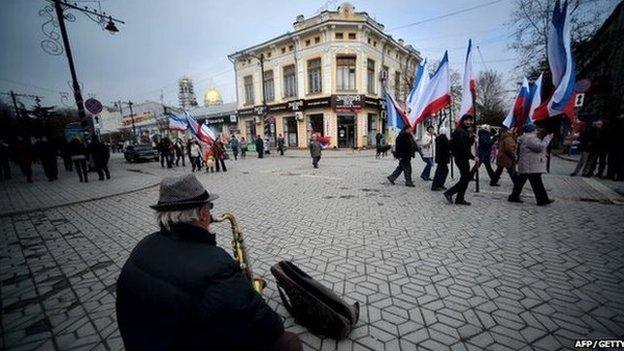
The city of Simferopol seems peaceful on the first anniversary of Russia's takeover of Crimea
A year ago, reporting from Simferopol about the takeover of Crimea by Russia was a tense and difficult business.
At any moment, as the gangs of activists who had flooded across the border swaggered through the city streets, violence seemed on the point of breaking out. Today, Simferopol is completely peaceful.
There are no soldiers on the streets, and no one stops us as we set up our television camera in the main square, overlooked by its statue of Lenin, or asks us for accreditation.
The reason is simple: the transfer of Crimea from Ukraine to Russia has become an accepted fact.
No return
When a few pro-Ukrainian supporters gathered the other day at the statue of the Ukrainian poet Taras Shevchenko in Simferopol to mark the anniversary of his birth, they were quickly moved on.
Three demonstrators were arrested - apparently for wearing Ukrainian colours - tried, and sentenced to a few hours' community service.
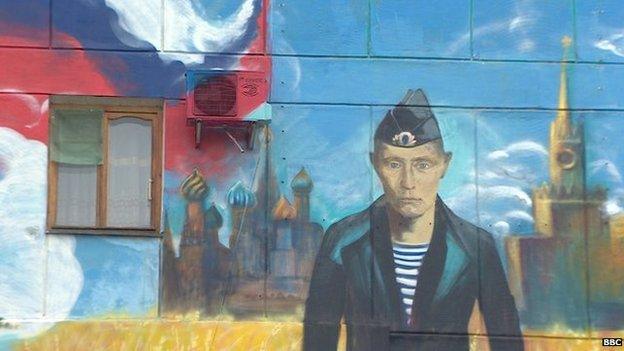
A mural depicting President Putin is visible on a wall in Sevastopol
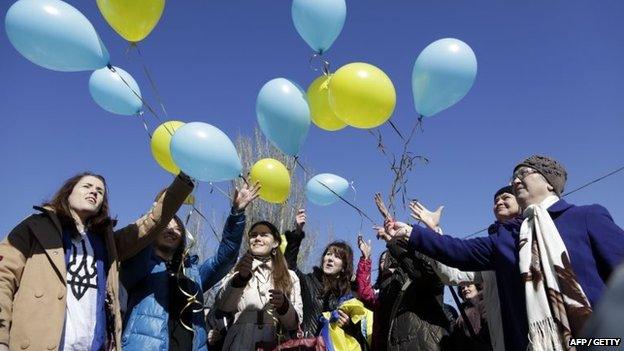
Pro-Ukrainian supporters in Simferopol can be arrested for wearing Ukrainian colours
"I was fired from work today because it was considered it wasn't appropriate for my job," said one of them, Leonid Kuzmin, a young pro-Ukrainian teacher. "We will obey the law, but we are going to fight it in the courts."
"Crimea will never return to Ukraine," says the region's prime minister, Sergei Aksyonov. "The decision has been made once and for all."
The decision he means was the referendum a year ago which gave overwhelming endorsement to those who wanted Crimea to return to Russian control.
Mr Aksyonov, a burly, jovial figure who is often alleged to have been involved in gangland activity in the past, admits that he was not told beforehand of the plans by Russia's President Vladimir Putin to take back Crimea early last year.
But he became a significant figure in what Western countries regard as effectively a coup d'etat.
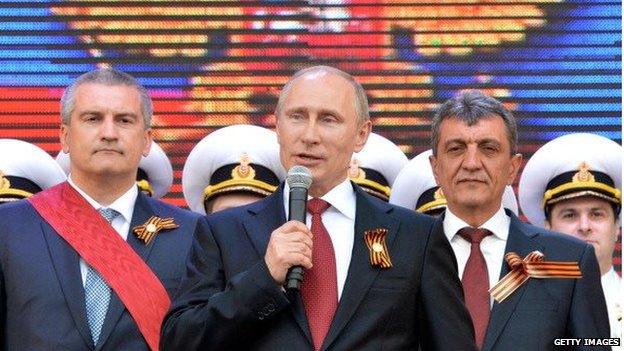
President Putin officially annexed Crimea on 18 March 2014
According to an opinion poll in February conducted by pollster GfK, 93% of the people asked said that they were happy that Crimea was under Russian control.
Such an overwhelming figure might look distinctly Soviet, or even North Korean; but the polling organisation which conducted it was Ukrainian, not Russian.
And even though plenty of people no doubt thought it would be better to give the safe answer, the general sense of peace and quiet on the streets seems to indicate that they accept what has happened.
Russian majority
The demographics of Crimea go a long way towards explaining why things are so calm here a year on.
The most recent figures indicate that something like 60% of the population are ethnic Russians, 25% ethnic Ukrainians, and 12% Crimean Tatars.
Given that many pro-Ukrainians have left, the Russians are probably proportionately in even more of a majority.
In our interview, Mr Aksyonov was reassuring.
PM Aksyonov insists the annexation of Crimea was democratic and "not an act of aggression"
"Neither the Crimean Tatars nor the Ukrainians have any reason to worry," he said.
"The only people who need to worry are those who are trying to destabilise the situation."
But that does not ease the anxieties of either group.
The Tatars used to have their own parliament here, but last September it was abolished, and the building closed down.
In the street outside it, I talked to a former Tatar MP, Zair Smerdlyav.
"Today," he said, "various actions are being taken against the Tatar people: kidnappings, killings, arrests and fines."
Major change
At the local Tatar television station, ATR, the staff feel that they are in constant danger of being closed down, though they continue to report what they regard as violations of human rights.
But the authorities clearly prefer to keep the situation here as calm as they can.
In one school I visited for instance, the main medium of instruction has been changed from the Ukrainian language to Russian; but if parents want their children to continue learning in Ukrainian, the school accommodates them.
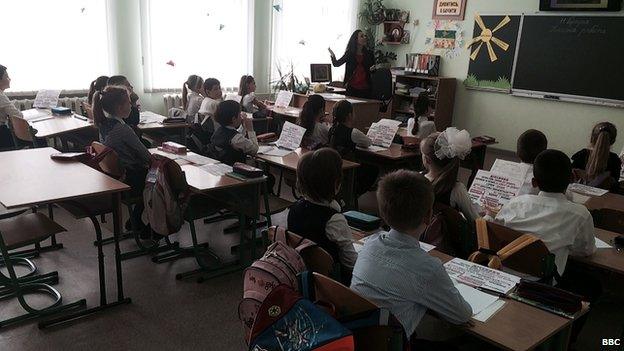
Politics is not part of the curriculum at this school in Simferopol, according to teachers
Thirty-one classes are now taught in Russian, and nine in Ukrainian. Some children are also taught in the Tatar language, if their parents choose.
"We leave politics completely out of the school environment," says headmistress Valentina Lavrik. "Tolerance is the main principle in our team."
Going round from class to class, it was certainly my impression that this was genuine.
But there was no doubt that a major change had happened to the school, just has it has to Crimea as a whole.
Political boost
In the library there is now a big, smiling photograph of Mr Putin, and his office has devoted a number of works of Russian literature to the school.
The history taught here is Russian history, not Ukrainian.
Crimea has always looked and felt Russian, and it has played an important part in the history that is now taught at its schools.
That is certainly the way the great majority of Russians feel. Getting it back has given Mr Putin a huge political boost at home.
The outside world's response has made life a little harder for people here.

There are now some empty shelves in the otherwise full and attractive supermarkets.
You cannot use Western credit cards here or use an international phone.
Mr Aksyonov's government will have its work cut out to help the businesses of Crimea or to attract foreign tourists to what is one of the most attractive parts of Europe.
But for him, and for the Russian government which planned the seizure of Crimea, that is a price thoroughly worth paying.
And in the meantime, there will be no agreement on the basic question: was it a coup d'etat or a justifiable, democratic decision by the people here?